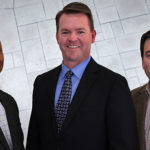BAYTOWN—When Memorial Baptist Church Pastor Brad Hoffman heard Trinity Baptist Church was struggling and looking for help, he knew the solution—merging congregations and renovating the building—would require a big step of faith for Trinity’s members.
But Hoffman never dreamed how much it would transform his own church’s ministry and evangelism.
|
The north campus of Memorial Baptist Church in Baytown provides Sunday morning worship but with a distinctly modern edge. Fog and lights flood the stage during services of music and prayer.
|
Only 16 members remained at Trinity Baptist Church fall 2007 after about a decade of steady decline; the church was at its largest in the mid-1990s with 200 members. Trinity Pastor Bill Herrin approached Hoffman in September 2007 about offering Trinity’s facilities as a Memorial Baptist satellite campus. The conversation was timely, Hoffman said.
“About two and a half years ago, we began praying at Memorial about having a second campus and moving into the multi-site concept of doing church,” Hoffman said.
Church leaders at Memorial had set their sights on the northeast side of Baytown to focus new ministry in the fastest-growing part of the city. When Herrin called Hoffman in September about combining efforts, Hoffman realized Herrin’s church, situated in the heart of northeast Baytown, would provide a perfect location.
The remaining members of Trinity Baptist Church faced a dramatic and difficult change, however. Instead of trying to revive Trinity Baptist Church’s ministries, Hoffman determined it was time for a fresh start. The Trinity congregation had to merge with Memorial Baptist Church for healthy ministry to continue.
“Zero plus zero equals zero. You can’t keep something perpetually on life support,” Hoffman said. “Our solution was to shut [the church] down, have them relocate to our original campus and integrate.”
Trinity Baptist Church finally closed the building in December, and for the next few months Memorial and former Trinity Baptist members worked side-by-side to renovate the building and reinvent its purpose for ministry.
“There are some families out there that I could not be more proud of for taking this on as their mission,” Hoffman said. “Our church just pulled together.”
Sign up for our weekly edition and get all our headlines in your inbox on Thursdays
The doors of what was formerly Trinity Baptist Church reopened Easter 2008 to a completely transformed venue for worship and fellowship, known now as Memorial Baptist’s north campus. More than 200 people attended the church’s first service, and for the former Trinity Baptist Church members, seeing the church building filled was a realized dream.
During renovations, Hoffman maintained a vision for reaching out to the immediate community.
“We knew the demographic (of the northeast area). They’re young families out there. We designed something specifically targeting young adults,” Hoffman said.

A coffee bar with 16 kinds of coffee opens 30 minutes before each Sunday worship service.
|
Memorial’s original campus offers Sunday school classes and other weekly functions for members, representing a more traditional model of church life. In contrast, the north campus only provides Sunday morning worship but with a distinctly modern edge. Fog and lights flood the stage during services of music and prayer. The north campus features a coffee bar with 16 kinds of coffee, which opens 30 minutes before each Sunday worship service.
But the church isn’t just a Christian coffee shop with a lights show. It’s designed to appeal to younger generations as part of an intentional evangelism strategy, Hoffman said.
“It is highly relational,” he explained.
“We are able to work our relationships … to earn the right to share Christ, to witness to authentic, live faith.
“People come before the service just to talk, and stay 30 to 40 minutes after the service just to talk or grab a cup of coffee. Not to say that the traditional model can’t be that, but in essence it’s not driven by the same priorities.”
For smaller, generational churches considering the future, Hoffman expressed hope that donating property to churches with “a vision for multi-site ministry” becomes a viable option. Herrin’s generosity and his congregation’s flexibility enabled a ministry for Memorial Baptist that “seemed impossible,” Hoffman said.
“We call it a God thing in the sense that he gave us an asset that we really weren’t searching for, and he placed it in our laps. As it came together it became very apparent that God was in this in a huge way,” he said.














We seek to connect God’s story and God’s people around the world. To learn more about God’s story, click here.
Send comments and feedback to Eric Black, our editor. For comments to be published, please specify “letter to the editor.” Maximum length for publication is 300 words.